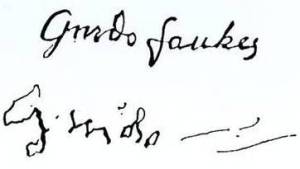‘….the fifth of November, Gunpowder treason and plot, I see no reason why gunpowder treason, Should ever be forgot’.
 On this day in 1605, the conspirator Guy Fawkes (1570-1606) was arrested following the most audacious attempt at an act of political terrorism in British history (at the time). Guy Fawkes also liked to be known as Guido Fawkes and despite being born in York of Protestant parents, was a Spanish Catholic mercenary.
On this day in 1605, the conspirator Guy Fawkes (1570-1606) was arrested following the most audacious attempt at an act of political terrorism in British history (at the time). Guy Fawkes also liked to be known as Guido Fawkes and despite being born in York of Protestant parents, was a Spanish Catholic mercenary.
While still a boy, he was taught about King Henry VIII’s ruthless subjugation of the Catholics some forty years earlier and he was appalled by the continuing persecution of his Catholic friends.
Fawkes fought alongside the Spanish in the Netherlands (at 22) and eleven years later (in 1603), he rode to Spain in a failed attempt to persuade the King to raise an army against his Protestant homeland. He returned to England and joined a small group of conspirators, led by Robert Catesby, who had already been named as an accomplice in the 1603 plot against the King. They planned to blow up the Houses of Parliament during the state opening ceremony attended by the King.
The Gunpowder plot was foiled as Francis Tresham wrote to his brother-in-law, Lord Monteagle, advising him not to attend. Suspicion was raised and Lord Monteagle informed the government. Government troops were lying in wait for the conspirators when they returned to the vaults below the Houses of Parliament to light the fuse. There has been some speculation that the plot was almost encouraged to develop to this stage to ensure public humiliation of the conspirators and an opportunity to suppress the Catholic dissent which was rising within the country at the time.
Although not a day remembered with fondness by Guy Fawkes during his few brutally painful remaining days, 5 November was declared a day of national celebration. Combined with the fire festivals already prevalent at this time of year, it still survives as Bonfire Night, Firework Night or Guy Fawkes Night. Effigies have been burnt on the bonfires since as early as the 1670s, although they were originally more likely to be of the Pope than of Guy Fawkes!
Perusing the historical records of more recent centuries, a few people have been recorded in the General Register Office (GRO) indexes in England and Wales with the name of Guy Fawkes, including Guy Fawkes Joseph Sansom (1848-1850), Guy Fawkes Petch (1887-) and Guy Fawkes Moss (1892-). Slightly more challenging to uncover is Sir Charles Guy Fawkes Turner who is recorded in 17 King Square, Bristol in the 1911 census though his birth is referenced as Sir Charles G F Turner.
And further afield, Reginald Guy Fawkes Blackwell was reported as a deserter in the New South Wales Police Gazette on 8 March 1905:

….one wonders if he was ever found! Another blog was written in 2012 on this topic – a ripping read! So, enjoy all those sparklers, bonfires and fireworks this evening (and other nights over the course of this week I am sure) as I fly home. Be safe ….!

